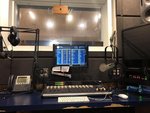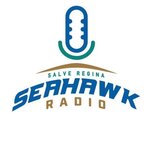

NEWPORT — Not only has the current global health crisis dominated the content of the news and entertainment media we consume, it has had an appreciable impact on its form as well.
The sight of news anchors reporting from home, or of game shows playing to empty studio audiences, has become commonplace. One might think that the student-run media at local universities (all of which have shuttered their campuses and transitioned to online classes for the foreseeable future) would have been suspended entirely – yet at Salve Regina University, a handful of determined students have been working diligently to keep their outlets in print and on the air.
“If you're going to be stuck at home anyway, you may as well tune in and let us try to boost your mood,” is Isabelle Gillibrand's philosophy, and it is what's keeping Seahawk Radio on the airwaves even after the closing of the school's campus – including the studio in the basement of the Wakehurst Student Activities Center from which the station usually broadcasts.
“We first heard on the Thursday of Spring Break that we'd be moving to remote-learning through to Easter,” she says, “so we started trying to make plans for the radio station then. By the time the second announcement came out, saying that classes would be online for the rest of the semester, it really wasn't a surprise.”
For now, the station has transitioned to using the online streaming service Spotify in order to allow student D.J.s to continue their broadcasts from home.
Gillibrand, a senior at Salve and the president of Seahawk Radio, says that this program of “Quaran-tunes” is more than just a means of whiling away the time.
“For a lot of our hosts, being able to get in the studio once a week was their chance to escape from schoolwork and stress for an hour or two,” she says. “With everything going on, that's more important now than ever.”
As a senior, Gillibrand admits she is a bit disappointed that her final semester with Seahawk Radio (which she has been a member of for her entire Salve career) is being spent away from the studio.
Isabel Thornton, the editor-in-chief of Salve's literary magazine “The Willow,” says that a similar sentiment motivated her to make sure that the publication was released on schedule this semester despite the challenging circumstances.
“Many of our contributors are graduating this year, and I felt like we really owed it to them to make sure that their final issue made it out,” she explains.
“The Willow,” a collection of student-submitted poetry, prose and artwork, is published on a semesterly basis.
Although this semester's issue had originally been scheduled to be printed on April 24, the current pandemic has introduced unexpected difficulties to the publication process – not the least of which is the fact that Thornton is currently 250 miles away.
Unable to leave her home in Barre, Vermont, the Salve junior has had to rely on other means of organizing the publication.
“We have 16 or so students working to put “The Willow” together, so we've had multiple huge group texts and Facetime meetings trying to get all of this squared away,” she says. “Right now our plan is to go digital for this semester.”
Although physical copies will not be reaching the stands, Thornton believes that the magazine will still be able to make its intended release date.
Another Salve publication that has moved into digital space is “The Mosaic,” the college newspaper — although in this case, the transition occurred before any concerns over the novel coronavirus arose.
“A few years ago, we realized it just made more sense for us to put the paper entirely online,” says Mosaic Co-Editor Henry Nickerson.
“With everything happening right now, it definitely looks like it was a good thing that we did.”
Nickerson is a Kansas native, but has made the decision to remain in Rhode Island for the duration of the crisis in order to continue his work with the newspaper.
“It seemed like it would be best for “The Mosaic” to have someone stay in the area to cover everything going on,” he says.
So far, the paper's COVID-19 coverage has included a piece on the effects of the pandemic on Salve's athletic programs and a report from a student based in the heart of the American outbreak in New York City.
“We're going to do everything we can to share stories and foster a sense of community, even with so many students off campus,” Nickerson says.
Dr. Matthew Ramsey is the chair of Salve's English Department, which includes all of the students mentioned above as members (with a major in either Communications or in Literature).
Ramsey says that he is proud of the way they have risen to the challenge of keeping the school's media running in the face of Coronavirus.
“The students have all been doing incredible work,” he says. “From keeping the radio and Mosaic going, to making sure that the student elections still take place on schedule — it's honestly really impressive.”
Hopefully, the change of semesters will mean a return to regularly scheduled programming at Salve Regina University. In the meantime, the college's intrepid reporters and devoted radio anchors testify to the hashtag which the school introduced in response to the pandemic — #SalvesGotThis.